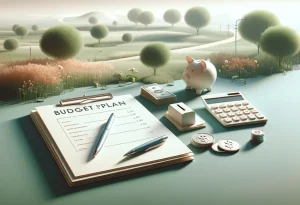Every month, that little calendar notification pops up: it’s time to balance the checkbook and confront your spending habits. If you’re sighing at the thought, you’re not alone.
By the end of this post, you’ll have the tools and confidence to create a budget that flexibly fits your lifestyle and financial goals.
Quick Takeaways:
- Track spending to the penny and categorize it to create a realistic budget that gives every dollar a purpose and helps avoid debt.
- Set SMART goals for your budget, automate savings, and adjust your plan regularly to align with life’s changes.
- Balance fun and finances by exploring creative entertainment options and using tools that keep budget management straightforward and effective.
Disclaimer: Information on this blog is for general educational purposes only and does not constitute personalized financial advice. Always consult a qualified financial advisor before making any financial choices.
Why is Budgeting Your Money So Important?
Budgeting is like your personal finance roadmap; it shows you where you are right now, where you want to be, and how you’ll get there. By giving every dollar a job — whether it’s for bills, savings, or a little fun money — you’re taking the driver’s seat in your financial journey.
The real beauty of budgeting is that it prevents you from flying blind with your spending. Without a budget, it’s easy to end up scratching your head at the end of the month, wondering where all your hard-earned cash vanished to. By laying out a budget, you’re less likely to get caught in the debt trap since you’ve planned your spending ahead of time.
But the perks don’t stop there. Budgeting means you’re squirreling away funds for future dreams and goals. Fancy a tropical getaway or a shiny new car? A budget can help you save for these goals without the stress of last-minute scrambles.
Plus, when life throws a curveball your way — a job loss, unexpected bills — your budget is your safety net to help you weather the storm. It’s all about having a clear financial picture, which gives you peace of mind and keeps those money-related worries at bay.
What Are the First Steps in Creating a Budget?
Diving into budgeting headfirst starts with getting a clear snapshot of your financial ins and outs. Start by tracking every penny you spend — yep, even that cheeky morning coffee or the impromptu movie night — it all adds up.
Categorize your spending into buckets like ‘Necessities’, ‘Wants’, and ‘Savings/Investments’. This will help you see where your money’s going and spot categories where you can tighten the belt if needed.
Now, let’s talk income. Your budget is as much about what’s coming in as what’s going out. So, make sure you’ve got a handle on all your income sources, and don’t forget to include side gigs or infrequent income like bonuses or tax returns.
In this step, honesty is your best policy. It’s tempting to overlook the little splurges or overestimate your income, but being thorough and realistic sets the foundation for a budget that actually works for your life.
How Do You Set Realistic Budgeting Goals?
When you’re setting goals for your budget, think SMART. That’s not just being clever here — it stands for Specific, Measurable, Achievable, Relevant, and Time-Bound. It’s about striking that delicate balance between what’s ambitious and what’s practical.
A fantastic way to nail this balance is to zero in on specific short-term goals. Instead of a vague “I want to save more,” set your sights on something tangible, like, “I’ll save $300 for holiday gifts by December.” This makes your goal feel real and within reach.
And don’t bite off more than you can chew. If you aim too high too fast, you might end up feeling burnt out. Start with small, achievable objectives and as you knock those out of the park, you can gradually expand your ambitions.
Here’s a practical tip that’s often overlooked: Automate your savings. Setting up an automatic transfer to your savings account each payday means you’re saving without even thinking about it. It’s one less thing to worry about, and it keeps your goals on track effortlessly.
Remember, your budget is a living, breathing plan. Life changes, and so should your budget. Check in with it routinely, and don’t be afraid to tweak it. The key is flexibility and keeping it aligned with what’s happening in your world.
Stick around — there’s more to learn about mastering the art of budgeting. We’ll keep breaking it down, so you can build a financial future that’s as bright as you want it to be.
Can You Have Fun While Sticking to a Budget?
Absolutely! Crafting a budget doesn’t mean you’ve got to kiss the good times goodbye. You can still have a blast without blowing your finances sky-high. It’s all about balance and prioritization.
First things first, let’s tackle the ‘fun’ side of things. Assign a slice of your budget for leisure – it’s a crucial ingredient for a happy life, after all. Here are some ways to make sure you squeeze the most out of every dollar earmarked for enjoyment:
-
Get Creative with Entertainment: Think beyond the pricey concert tickets and restaurant tabs. Picnics, hikes, potluck dinners with friends, or free community events can be just as fun without the hefty price tag.
-
Use Digital Deals: Leverage coupon and discount apps for dining out, movies, or local attractions. Sometimes, planning your fun around these deals can lead to significant savings.
-
Rethink Subscriptions: Do you need all those streaming services? Rotate them! Subscribe to one service at a time and binge the shows or movies you’ve been eager to see.
-
Staycation: Who says you have to go far to have a decent break? Be a tourist in your own city, discover new spots, or enjoy a relaxing day at home with a good book or DIY spa day.
-
Friend Funded Fun: Initiate activities where everyone chips in – whether it’s renting a cabin for a weekend or a boat for a day on the lake. Pooling resources can make bigger ticket items more attainable.
In short, you don’t have to splurge to sparkle. With a handful of smart strategies, you can keep the merriment high and the spending low.
What Tools Can Help You Maintain Your Budget?
To keep your budget on a tight leash and make sure every dollar is doing its job, you need the right set of tools. From digital to traditional, there’s something for every taste and style.
Apps
In the digital age, budgeting apps are like having a financial advisor in your pocket. Apps such as Mint, YNAB (You Need A Budget), or PocketGuard can help you track your expenses in realtime, set goals, and flag any unusual spending. These tools often link directly to your bank accounts for a seamless financial overview.
Spreadsheets
For those who love a hands-on approach, spreadsheets can be incredibly powerful. Google Sheets or Microsoft Excel let you tailor your budget to your exact specifications. You can find a multitude of free templates online or create your own. The benefit here lies in the customization – every pixel can be personalized to your needs.
Envelopes
Going old school with the envelope system can enforce discipline in a way technology can’t match. Assign an envelope to each budget category – like groceries, gas, and, yes, fun. Once an envelope is empty, that’s it until the next refill. The physical act of seeing the cash dwindle can be a sobering, yet effective, approach.
When choosing your tool, consider your lifestyle and preferences. An app might be right up your alley if you’re always on the go, while a spreadsheet could be more your speed if you like to sit with your finances and ponder. And don’t discount the tangible satisfaction of using cash envelopes if digital feels too abstract.
It’s wise to try a combination and see which one (or more) resonates with your personal style. After all, the best tool for you is the one you’ll use consistently.
Let’s be real here: the most unique advice that many overlook is simplicity itself. Choose the simplest tool that meets your needs. If an app has too many features or a spreadsheet gets too complicated, you’re less likely to stick with it. Just because it’s sophisticated, doesn’t mean it’s better. In budgeting, the best method is the one that makes it easy for you to stay on track.
Remember, a budget isn’t a chain that restrains you; think of it more as a roadmap guiding you to financial freedom. With the right mindset and tools, you’ll be driving down Easy Street while keeping your wallet happy.
As a financial advisor, my goal is to guide you through the world of personal finance with clear, practical advice. With a dedication to clarity and your financial well-being, I’m here to provide insightful guidance and support as you build a foundation of wealth and security.



